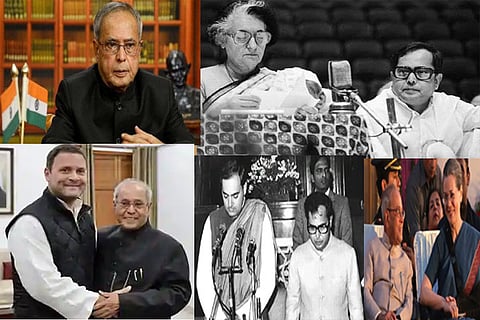

Chennai
Seven times a Member of Parliament, he served in the Cabinet of three Prime Ministers, and held, at one time or another, the important portfolios of finance, defence, and external affairs. At least twice, he was a heartbeat away from becoming Prime Minister.
It seemed there for the asking after Indira Gandhi was felled by assassins, but the Congress rallied around her son Rajiv, leaving Mukherjee for a short time in the political wilderness. Later, Mukherjee would maintain that it was he who mooted the idea that Rajiv Gandhi takes prime ministerial office. What was never fully explained was why Rajiv Gandhi refused to accommodate him in his Cabinet and later expelled him from the party. In 2004, another window could have opened after Sonia Gandhi refused the premiership; once again, Mukherjee was passed over, this time in favour of the more benign and arguably more yielding Manmohan Singh.
But Mukherjee went from making the transition from scholarly politician to statesman effortlessly, becoming India’s first citizen, a post he held between 2012 and 2017 with dignity and the necessary impartiality during both the UPA and the NDA governments. He was conferred the Bharat Ratna by a Modi government that was pleased by his non-partisanship, but also aware that such an honour would not go well with Sonia and Rahul Gandhi (neither of who attended the award ceremony).
In many ways, he belonged to the old school of Congress politics, one where it was important to recognise the real power structure, essential to maintain confidences, and critical to be schooled in the intricacies of backroom manoeuvres. He rose to become Indira Gandhi’s go-to person, her “man for all seasons”. His loyalty to her was unbroken during the Emergency, a period in the country’s history, he would recall without a clear-cut apology, even if he allowed himself a tinge of regret. Another controversy in his political life related to his last tenure as Finance Minister, where he took decisions such as levying a controversial retrospective tax, reportedly against the wishes of Prime Minister Manmohan Singh and Congress president Sonia Gandhi.
If his passing feels like the end of an era, it is because he was the last surviving major figure from the Indira Gandhi era. Very few politicians have witnessed the changes in the Indian polity at such a close quarter, and with such an acute perspicacity. The top job may have eluded him, but there is no argument that he reached the very summit in terms of achievement. He had every right to say as he did: “I am comfortable at the height at which destiny has put me.”
Visit news.dtnext.in to explore our interactive epaper!
Download the DT Next app for more exciting features!
Click here for iOS
Click here for Android